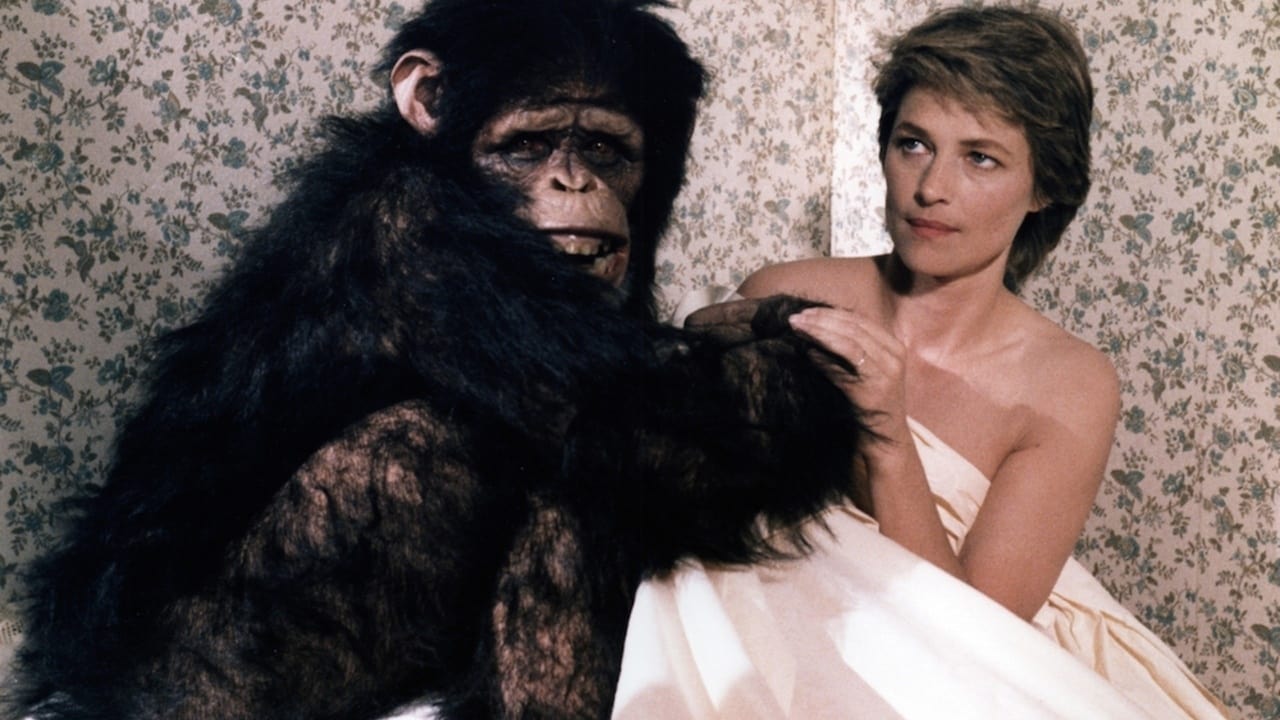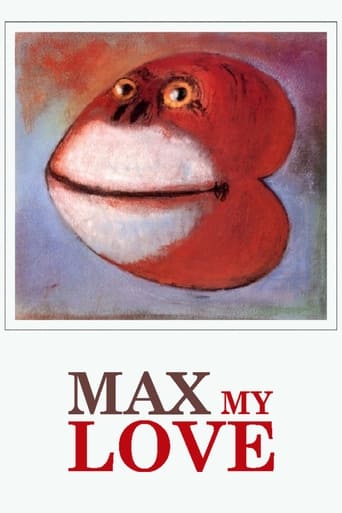

What makes it different from others?
... View Moreterrible... so disappointed.
... View MoreSave your money for something good and enjoyable
... View MoreExcellent and certainly provocative... If nothing else, the film is a real conversation starter.
... View MoreMAX, MON AMOUR received a tepid reaction when it debuted in Cannes in 1986, a French- American co-production under the rein of the late Japanese provocateur Nagisa Ôshima (1932- 2013), which would become his penultimate feature film. Since then, it has become a succès de scandale which is less being watched than hyped due to its subversive content, but in fact, most of the time, it suffices as a tongue-in-cheek comedy, a marital satire borne out of Jean-Claude Carrière's urtext, Peter Jones (Higgins) is a liberal-minded British diplomat working and living in Paris, one day, to his utter dismay, he finds out the paramour of his wife Margaret (Rampling), is a male chimpanzee named Max, beggar belief, the couple decides to try out a kind of ménage-à-trois by bringing Max into their official residence, where also lives their towhead school-age son Nelson (Hovik), and believe it or not, in the end of the story, their co-habitation actually works. Cagey about the salacious details of the relationship between Margaret and her "supposed" primate lover, Ôshima sides with the husband's point-of-view to parse the couple's tug-of-war, firstly, Peter takes up the gauntlet to show his magnanimity by accepting the situation without letting it get under his skin, then, driven by curiosity and jealousy, his attitude towards Max seesaws between hostility and respectable concern, an experiment of corroborating the inter- species sexual act is a bust, whereas an episode of shotgun scare is just a cheeky practice of cheap tension.It is an immoral cock-and-bull story, menace is palpable, but vice has never descended into the picture and what sagaciously affirming is the film's brazen stance on the dynamism between the couple, it is always Margaret who has the say-so in their states of affairs, however preposterous and quixotic, there is a deep respect unites them as an entity, Peter stoutly fights her corner in the face of extrinsic parties, whether it is a zoologist or a neuropsychologist, accordingly, she also quite frank about her feelings, even stays on friendly terms with Peter's secretary-cum-lover Camille (a gratingly loud Diana Quick). It is a surprise that Ôshima chooses not to go out on a limb in salting the plot by bestowing Max with a feral complexion, alternatively played by real chimps and stunts in verisimilar costumes (solely by this reviewer's reckoning), Max is presented as a meek pet, not dangerous, sulky at most, albeit his human-like size, even becomes mawkishly lovelorn and loses his appetite when Margaret is absent. Granted, there is a touching and tender naiveness seething beneath its surrealistic premise, which also is not exactly congruent with Ôshima's make-up if one might venture to surmise. Both Rampling and Higgins tackle the thorny subject with bravura, what percolates from their collective effort is a beguilingly unfeigned sophistication stemming from a bourgeois background, and Ôshima conspiratorially sends up their caprices with deadpan seriousness, not to mention a non sequitur triumph appended to the part where Max momentarily goes missing in the woods. Ultimately, MAX, MON AMOUR doesn't come to provoke moralists, but offers a keyhole for the audience to observe a behavioral pattern says as much of living beings' universality as their idiosyncrasy, the point is made, but reverberations are somewhat deadened when Ôshima settles for a middle road between "funny and die" in his overall approach.
... View MoreInteresting - an international co-production that results in a real creative fusion, not the usual mush. This movie pits deadpan surrealist aesthete Jean-Claude Carriere's script against tantrum-prone transgressor Oshima in the service of a narrative where Charlotte Rampling falls in love with a chimpanzee. In spite of the rampant in-your-face perversity, though, Carriere holds the balance of power - Oshima wouldn't have thrown in that climactic victory parade, and I doubt he could have pulled off such an informed spoof of the French bedroom comedy on his own. The bemused passivity of the husband can get a little cloying, but it's pretty remarkable how viscerally sensual the movie gets in the Rampling-chimp lovey sequences. And that goes double once you realize that it ain't no chimp - it's another Rick Baker masterpiece for ya, so that makes three auteurs.
... View MoreA peculiar love triangle. English ambassador Peter Jones (Anthony Higgins) sends a detective to find where his wife Margaret (Charlotte Rampling) goes nearly every day. She has taken a small flat, and he goes there, only to discover that her lover is Maxa chimpanzee. Max comes to live with them, and jealousy complicates matters. It's hard for Peter to accept that Margaret loves both of them. The story is resolved with understanding. As a fable about sex, it remains puzzling, though probably the moral of the story is that people like different things, and if nobody gets hurt, what's the big deal? The plot itself, of course, is absurd, and some of the fringe characters play it for comedy, especially the experts the Jones' friends try to introduce, and the maid Maria (Victoria Abril), who seems to be allergic to Max. But the center of the film is tense, even severe at times. Still, Peter is mostly elegant and bothered in much the same way he'd be bothered by jealousy accompanying the usual sort of affair, and Margaret is smiling and self-possessed and calm. Rampling and Higgins play perfectly in the mode of comedy that has its characters act around a crazy premise as if it were ordinary, and so the film is improbably charming.
... View MoreMainly, this film is about Charlotte Ramplings love for a monkey (a chimpanzee, to be precise), and how her family, especially her husband, deals with it. In fact, upon finding out about his wives affair, Anthony Higgins' character remains surprisingly calm; he even proposes to have the monkey live with them in their house. Maybe he wants to prevent Rampling from leaving him; or he does so since he has an affair himself; or it is his attempt to be "open minded" even in front of an utmost unusual matter. But problems soon up: Not only does the maid (young Victoria Abril!) respond negative to the new guest; the couples friends slowly find up about the hidden secret and try to "help" by drawing in psychologist, zoologists, and so forth. Then, suddenly, Max, the monkey is gone... Sounds weird? It is. All over the film, one is reminded of some of Luis Bunuels work. In one particular scene, Higgins eager to find if Rampling and Max do indeed share sexual experiences pays a prostitute to "visit" Max, about which she has no problems (other than Max!). One could read it as a commentary about, once again, the lifestyle of the Bourgeoisie and the boredom that drives them, but in fact all of the characters are likable and there's not hint of criticism on social inequalities. It's filmed in a "children film style" way, yet in its contents designed exclusively for adults. It makes for an enjoyable reception, but once you've seen it, it's not something you want to watch it all too soon, since "Max mon Amour" is basically attractive for the unpredictable unfolding of the story.
... View More